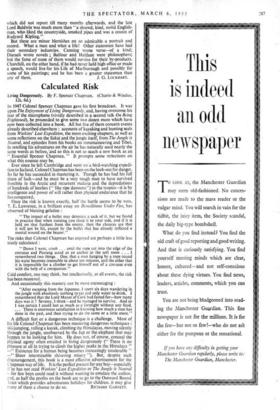Calculated Risk
IN 1947 Colonel Spencer Chapman gave his first broadcast. It was upon The Enjoyment of Living Dangerously, and, having overcome his fear of the microphone (vividly described in a second talk On Being Frightened), he proceeded to give some two dozen more which have now been collected into a book. All but five of them concern events already described elsewhere : accounts of kayaking and hunting seals from Watkins' Last Expedition, the more exciting chapters, as well as some reflections on the Sakai and the jungle itself, from The Jungle is Neutral, and episodes from his books on mountaineering and Tibet. In retelling his adventures on the air he has naturally used nearly the same words as before,"and so this is not so much a new book as an " Essential Spencer Chapman. " It prompts some reflections on what this essence may be.
Ever since he left Cambridge and went on a bird-watching expedi- tion to Iceland, Colonel Chapman has been on the look-out for danger. So far he has succeeded in mastering it. Though he has had his full share of luck—and he must be a very tough man to have survived frostbite in the Arctic and recurrent malaria and the depredations of hundreds of leeches C' like ripe damsons") in the tropics—it is by intelligence and power of will rather than physical endurance that he has conquered.
Once the risk is known exactly, half the battle seems to be won. T. E. Lawrence, in a brilliant essay on Demolitions Under Fire, has observed of blasting gelatine : " The impact of a bullet may detonate a sack of it, but we found in practice that when running you clasp it to your side, and if it is held on that furthest from the enemy, then the chances are that it will not be hit, except by the bullet that has already inflicted a mortal wound on the bearer."
The risks that Colonel Chapman has enjoyed are perhaps a little less nicely calculated :
" Down I went, crash . . . until the rope cut into the edge of the crevasse and Passang acted as an anchor in the soft snow . . . I remembered two things. One, that a man hanging by a rope round his waist becomes insensible in about ten minutes, and the other that it is impossible for a climber to get himself out of a crevasse even with the help of a companion."
Cold comfort, one may think, but intellectually, at all events, the risk has been mastered.
And occasionally this mastery can be more encouraging :
"After escaping from the Japanese, I spent six days wandering in the jungle with absolutely nothing to eat and only water to drink. I remembered that the Lord Mayor of Cork had fasted for—how many days was it ? Seventy, I think—and he managed to survive. And so I was certain I could last as much as a fortnight without any food. There is enormous satisfaction in knowing how much a man has done in the past, and then trying to do the same or a little more."
A difficult feat or a dangerous technique is a challenge. Most of his life Colonel Chapman has been mastering dangerous techniques : ski-jumping, rolling a kayak, climbing the Himalayas, moving silently through the jungle, unobserved by the Jap or the elephant that may happen to be looking for him. He does not, of course, conceal the physical agony often entailed in living dangerously (" There is no pleasure at all in trying to climb the higher peaks in the Himalaya " —" Existence for a human being becomes increasingly intolerable " —" Sheer interminable shivering misery "). But, despite such discouragement, this book is a most effective advertisement for the hapman way of life. It is the perfect present for any boy—especially he has not read Watkins' Last Expedition or The Jungle is Neutral ---for few boys could read it without wanting to emulate the author, and, as half the profits on the book are to go to the Outward Bound 1 rust which provides adventurous holidays for children, it may give


































 Previous page
Previous page